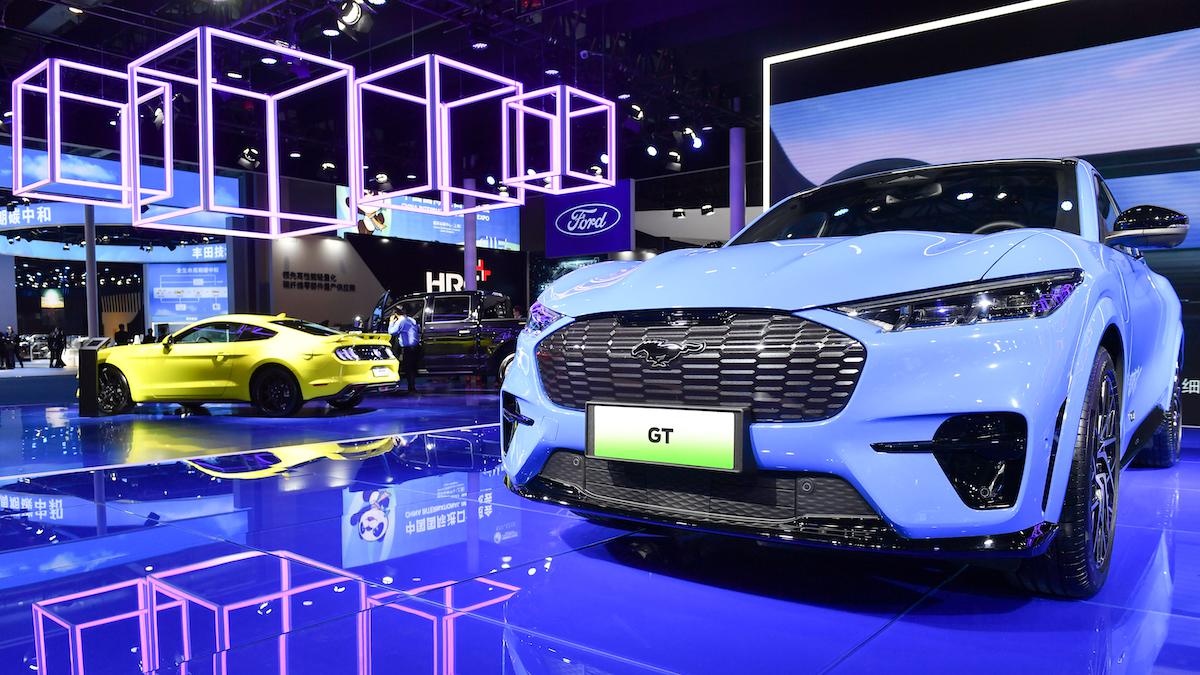
33 Countries and 11 Automakers Pledge No New Fossil Fuel Powered Cars by 2040

A Ford Mustang Mach-E GT electric car on display during the 4th China International Import Expo in Shanghai, China on Nov. 5, 2021. VCG / VCG via Getty Images
In the latest announcement to come out of the COP26 climate conference in Glasgow, a group of nations, automakers and local governments have pledged to ensure that all new cars are zero emission by 2040 worldwide, and no later than 2035 in “leading markets.”
The “COP26 declaration on accelerating the transition to 100% zero emission cars and vans” drew support from 33 countries and 11 automakers including Ford, General Motors and Volvo.
“As representatives of governments, businesses, and other organisations with an influence over the future of the automotive industry and road transport, we commit to rapidly accelerating the transition to zero emission vehicles to achieve the goals of the Paris Agreement,” the declaration said.
The Paris agreement sets a goal of limiting global warming to “well below” two degrees Celsius above pre-industrial levels and ideally 1.5 degrees Celsius. Meeting this more ambitious temperature goal has been a key theme of the COP26 negotiations, though current national pledges through 2030 put the world on track for 2.4 degrees of warming.
Climate advocates had mixed responses to the fossil-fuel-free vehicle pledge. On the one hand, major car companies have signed on, as well as key markets. Signatories include Canada, the Netherlands, Norway, Poland, Sweden and India. India’s inclusion is especially notable, because it is the world’s fourth-largest auto market and has not previously set a timeline for eliminating gas-powered vehicles, The New York Times reported.
“Having these major players making these commitments, though we need to make sure that they follow through, is really significant,” Margo Oge, a former senior U.S. air quality official and current advisor to car companies and environmental groups, told The New York Times. “It really tells us that these companies, and their boards, accept that the future is electric.”
However, Japan, China, and the U.S. did not sign the pledge, and these nations represent three of the world’s largest car markets. The automakers that signed on represented only around 25 percent of car sales in 2019. Major companies like Toyota, Volkswagen and the Nissan-Renault alliance did not sign the declaration.
Greenpeace Germany executive director Martin Kaiser told Reuters that the absence of these key players was “gravely concerning.”
“To stop new fossil fuels, we need to cut off our dependency,” he said. “That means moving on from combustion engines towards electric vehicles and creating clean public transport networks without delay.”
Other car companies that did sign on include Jaguar Land Rover, Mercedes-Benz and China’s BYD Auto. In addition, 27 fleet owners and operators signed on, including Uber and Leaseplan, which rents 1.7 million cars in 30 countries.
While the U.S. itself did not agree, the states of California and New York did, as well as major cities like Seattle, New York City, Los Angeles and Atlanta.

 233k
233k  41k
41k  Subscribe
Subscribe 